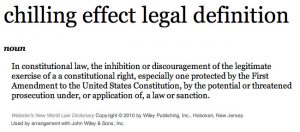Chilling effect is a term in law and communication that describes a situation where a speech or conduct is suppressed by fear of penalization at the interests of an individual or group. It can affect one’s free speech. Since many attacks rely on libel law, the term libel chill is also often used. The term chilling effect has been in use in the U.S since 1950.
In a legal context, a chilling effect is the inhibition or discouragement of the legitimate exercise of natural and legal rights by the threat of legal sanction. The right that is most often described as being suppressed by a chilling effect is the US constitutional right to free speech. A chilling effect may be caused by legal actions such as the passing of a law, the decision of a court, or the threat of a lawsuit; any legal action that would cause people to hesitate to exercise a legitimate right (freedom of speech or otherwise) for fear of legal repercussions. When that fear is brought about by the threat of a libel lawsuit, it is called libel chill. A lawsuit initiated specifically for the purpose of creating a chilling effect may be called a Strategic Lawsuit Against Public Participation, or more commonly called; a “SLAPP suit.”
The chilling effect is the suppression of free speech and legitimate forms of dissent among a population because of fear of repercussion. The effect is often generalized within a demographic as a result of punitive actions taken against others who have exercised their rights.
Although the term is relatively new, the chilling effect phenomenon has been observed and actively encouraged throughout history. Speaking out against the government or practicing any other forms of dissent was significantly suppressed during the Stalinist purges in Russia, for example, because of an understandable fear of imprisonment or execution. In the United States, activities and laws that encourage the chilling effect may be challenged in court if they are deemed a deterrent to individual rights, such as the right to free expression.
The term chilling effect originated in a case in the United States Supreme Court, where it was used in reference to the Constitution. Subsequently, Justice William Brennan, overturned a law requiring recipients of “communist political propaganda” to formally acknowledge that they had received it. Justice Brennan determined that requirement to be contrary to the plaintiff’s freedom of expression.
After Edward Snowden’s revelations about wide-scale NSA surveillance of the communications of United States citizens, many public interest groups suffered declining membership and a reluctance among existing members to communicate electronically.
The chilling effect is commonly mentioned as a result of SLAPP suits, a type of frivolous litigation undertaken to make it impractical for people to take legitimate action against activities of an individual or organization that may be in conflict with the public good.
The meaning of chilling effect has been generalized to refer to any activity that tends to suppress a given behavior. In that sense, the term is used in reference to negotiation tactics, economics and personal relationships, among a great number of other things.
“Chilling” in this context normally implies an undesirable slowing. Outside of the legal context in common usage; any coercion or threat of coercion (or other unpleasantries) can have a chilling effect on a group of people regarding a specific behavior, and often can be statistically measured or be plainly observed. For example the news headline “Flood insurance spikes have chilling effect on some home sales,” and the abstract title of a two‐part survey of 160 college students involved in dating relationships: “The chilling effect of aggressive potential on the expression of complaints in intimate relationships.
In United States and Canadian law, the term chilling effects refers to the stifling effect that vague or excessively broad laws may have on legitimate speech activity.
However, the term is also now commonly used outside of American legal jargon, such as the chilling effects of high prices or of corrupt police, or of “anticipated aggressive repercussions” (in say, personal relationships.
A chilling effect is an effect that reduces, suppresses, discourages, delays, or otherwise retards reporting concerns of any kind.
An example of the “chilling effect” in Canadian case law can be found in Iorfida v. MacIntyre where the constitutionality of a criminal law prohibiting the publication of literature depicting illicit drug use was challenged. The court found that the law had a “chilling effect” on legitimate forms of expression and could stifle political debate on issues such as the legalization of marijuana. The court noted that it did not adopt the same “chilling effect” analysis used in American law but considered the chilling effect of the law as a part of its own analysis.
Recognition that a law may allow for a chilling effect as a vehicle for political libel or vexatious litigation provides motivation to change such defamation laws, and therefore prevent censorship and the suppression of free speech.

